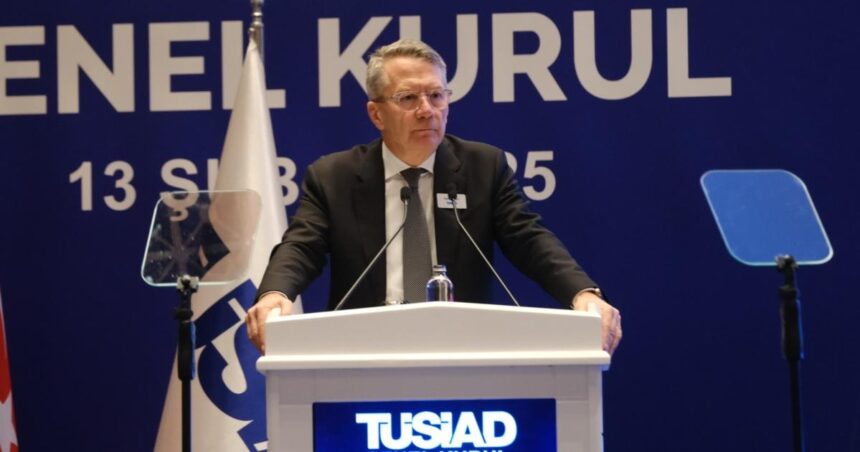Turkey’s leading business association has issued an unusually sharp rebuke of the government, warning of escalating economic instability, political interference in the judiciary, and the deterioration of democratic institutions. This marks one of its strongest public criticisms in years.
At TÜSİAD’s General Assembly held on February 13, the association’s High Advisory Council President Ömer Aras and Chairman Orhan Turan delivered speeches.
Their remarks covered a broad range of topics, from recent arrests and the dismissal of lieutenants to public incidents suspected of negligence, such as the Kartaltepe fire, the landslide at the İliç mine, and earthquakes, as well as global developments.
TÜSİAD executives emphasized the rule of law and noted that the cost of fighting inflation was becoming increasingly difficult to bear.
‘Detentions Becoming the Norm is a Chronic Issue’
Starting his speech by stating, “As a country, we are demoralized. We are experiencing a crisis of confidence,” TÜSİAD High Advisory Council President Ömer Aras addressed the tragic events that have surfaced since the February 6 earthquakes, where negligence has been suspected. He made the following observations:
“We have regulations, but many do not comply with them, and inspections are insufficient. The main cause of these deaths is systemic failure. The way to fix this system is clear. The system must have self-correcting mechanisms. Those responsible must step down, be held accountable, and be replaced with competent individuals.”
‘Turkey Has the Highest Number of Prisoners and Detainees in Europe’
Describing recent political developments as “extraordinary,” Aras also referred to the detentions in opposition-run municipalities, the arrest of talent agent Ayşe Barım, and the dismissal of lieutenants from the Turkish Armed Forces.
“The rapid succession of these incidents has caused public concern and eroded trust. Additionally, we see that the issue of detention becoming the norm rather than the exception has not been resolved despite legal changes.”
While acknowledging some positive economic developments, such as a slight decrease in inflation and strengthened Central Bank reserves, Aras stressed the need for continued commitment to fighting inflation.
TÜSİAD expects public sector savings in 2025 to be “more effective” in combating inflation.
“The state must adhere to budget discipline, control public expenditures, and increase savings,” he added.
‘Supporting Şimşek’s Economic Program Doesn’t Mean Everything is Fine’
TÜSİAD Chairman Orhan Turan echoed Aras’ concerns and added that new legal regulations now allow the State Inspection Council to remove public officials and enable the Savings Deposit Insurance Fund (TMSF) to appoint trustees to companies.
“Establishing a criminal organization now seems easier than starting a business. The cycle of femicides and child abuse remains unbroken,” Turan said, attributing these issues to the erosion of trust in the judiciary.
While TÜSİAD supports Treasury and Finance Minister Mehmet Şimşek’s economic program, Turan stated, “We cannot say that everything is going well in the economy.”
TÜSİAD stressed the need to “accelerate the fight against inflation” to prevent the accumulation of economic stress.
“It is becoming harder for both entrepreneurs and workers to bear the cost of fighting inflation,” Turan said. “Industrialists are struggling. Exporters are in distress. The appeal of imports is increasing.”
TÜSİAD also expressed concerns about failing to keep pace with global changes in climate and technology, calling for urgent action to ensure lasting success in fighting inflation.
TÜSİAD’s Proposals
Beyond criticism, TÜSİAD also shared a policy booklet titled Perspective: 2025 Transformation and Roadmap for the Future, outlining new policy recommendations.
The report identifies two key structural reforms essential for economic development:
- – Education and meritocracy add value to individuals.
- – The rule of law and an independent judiciary.
“If we can successfully implement these two reforms, all other reforms can be achieved more easily,” Aras stated.
Additionally, the report highlights rising income inequality in Turkey, citing factors such as high inflation, sectoral imbalances, informal employment, the heavy burden of indirect taxes, low female labor force participation, and regional development disparities.
Justice Minister Tunç: ‘No Institution is Above the Will of the People or the Law’
Reacting to the speeches, Justice Minister Yılmaz Tunç stated, “While it is a democratic right for civil society organizations to express their views, efforts to influence the judiciary and politics are contrary to the spirit of democracy and the principle of the rule of law.”
Tunç further emphasized:
“Those who fail to understand that the era of privileged elites directing Turkey is over must recognize that no one or institution is above the will of the people and the rule of law.”
‘Not Enough, But a Step Forward’
DEVA Party Chairman Ali Babacan, commenting on TÜSİAD’s statements, remarked, “Not enough, but a step forward.” He posed a critical question:
“Will Turkey’s economic growth remain concentrated in the hands of a few companies, or will the entire country prosper?”
Babacan warned that in a system where the judiciary is not functioning, political pressure is used as a tool against businesses, and only government-aligned companies thrive:
“Income inequality deepens, the middle class shrinks, and only a small elite enjoys prosperity. This situation is unsustainable.”
Once a powerful force in Turkish politics, particularly in the early 2000s when its statements significantly influenced government policy, TÜSİAD has remained largely silent since the 2016 coup attempt, fearing economic and legal repercussions. Its decision to speak out now reflects growing frustration within Turkey’s business elite over the country’s deteriorating economic and political landscape.



